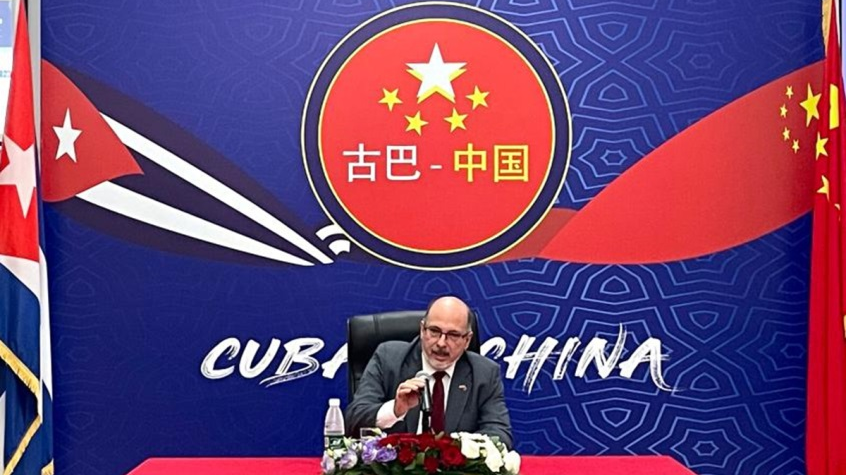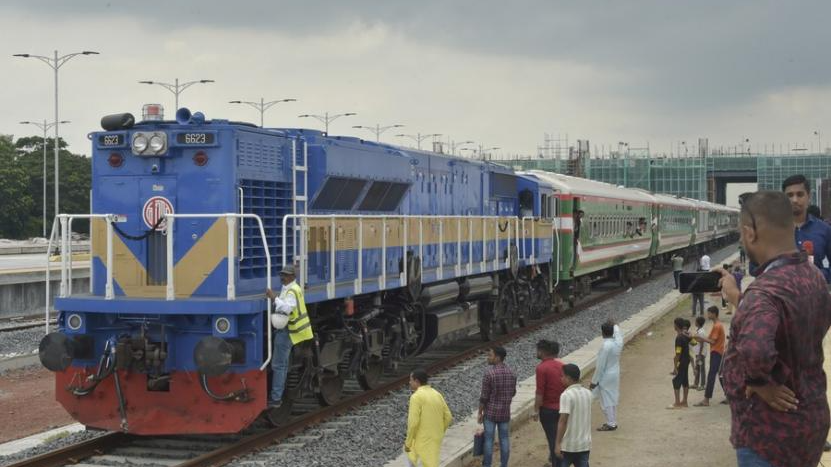
Cuban Ambassador to China Alberto J. Blanco Silva speaks at a press conference of the G77+China Summit, Beijing, capital of China, September 13, 2023. /Xinhua
Cuban Ambassador to China Alberto J. Blanco Silva speaks at a press conference of the G77+China Summit, Beijing, capital of China, September 13, 2023. /Xinhua
Editor's note: Yuan Sha, a special commentator on current affairs for CGTN, is an associate research fellow with the Department of Asia-Pacific Studies at China Institute of International Studies. The article reflects the author's opinions and not necessarily the views of CGTN.
The Group of 77 plus China (G77+China) Summit kicks off on September 15 in Havana, Cuba. With the Global South in the spotlight lately, and as one of the most important mechanisms of the Global South countries, this year's G77+China Summit would be a perfect place to observe the interests, concerns and goals of the Global South.
Collective rise of Global South
The Global South is a geopolitical concept, referring to a mixed grouping of developing countries with diverse economic, social and political backgrounds that share a common set of challenges and objectives. The term is in contrast to the Global North where most developed countries live.
One of the prominent phenomena of the 21st century is the collective rise of the Global South. With the shift of the geoeconomic center from the Global North to the Global South, the Southern countries have witnessed a growing presence on the world stage. Economically, emerging market countries and developing countries contribute as much as 80 percent of the global economic growth. Politically, they are advancing in the independence movement and demonstrate greater strategic autonomy. Internationally, they increased their voice and influence through active participation in global affairs.
A prominent case is the Global South's conspicuous and independent choices in the Ukraine crisis starting in early 2022. Most Global South countries, including large Southern countries such as China, India and South Africa, refused to follow the West in punishing Russia and voiced their discontent toward the Western double standards and the negative impact of the Western sanctions. The Global South is forging a new non-alliance movement to reject the Western attempt to redraw an Iron Curtain between East and West.
Furthermore, China and other large Southern countries have strengthened the weight of the Global South. The China-proposed Belt and Road Initiative (BRI) has pooled the collective resources and political will from fellow Southern countries, which has become an important platform to build infrastructure, facilitate trade and investment, share know-how and engage in cultural exchange. China as well as Brazil, India and South Africa also pushed for the development and expansion of the BRICS mechanism, collectively making the Global South a more salient force in the multipolar world.
Western scheme of "divide and conquer"
After the long-term neglect of the Global South, the West suddenly realized the fact that the Southern countries wanted to be equal on the world stage rather than being dictated by the West. Furthermore, the United States, eyeing China as the most serious strategic competitor, is uneasy about the growing popularity and influence of China in the Global South, and has begun to turn the Global South into a new battlefield for its great power competition.
The West has put on a diplomatic offensive lately to court Global South countries. Western leaders landed in the capitals of Southern countries at a pace rarely seen before. The Munich Security Conference, the G7 Summit and other Western-dominated platforms reached out to Global South countries. The U.S., the G7 and the EU are pouring money through its Build Back Better World (B3W), Partnership for Global Infrastructure and Investment (PGII) and the Global Gateway strategy, in an effort to counter the China-proposed BRI.

A man takes photos of a train ready for a trial run along the newly-constructed mega Belt and Road Initiative rail line via the China-built Bangladesh's largest Padma Bridge on the outskirts of Dhaka, Bangladesh, September 7, 2023. /Xinhua
A man takes photos of a train ready for a trial run along the newly-constructed mega Belt and Road Initiative rail line via the China-built Bangladesh's largest Padma Bridge on the outskirts of Dhaka, Bangladesh, September 7, 2023. /Xinhua
One notable trend is that the West is making efforts to distort the meaning of the Global South. In recent Western discourses, China has been left out of the Global South concept. The U.S. and some Western countries have been pushing to deny China the developing country status in order to suppress China, by depriving China of the preferential treatment normally conferred to developing countries and imposing higher costs on China such as climate responsibilities. More ominously, the U.S. is meant to drive a wedge between China and other Southern countries and to weaken the collective impact of the Global South. In fact, the Global South has now become a highly politicized concept.
However, the Western effort to divide and conquer is futile. According to the United Nations Development Programme, the term Global South refers to the Group of 77 countries plus China. As the world's largest developing country, China is an ex-officio member of the Global South. China and the other South countries share the same interests, concerns and identities, which date back to the anti-imperialist wars and the Bandung conference. Through decades of participation in the Global South agenda, China has already become an inalienable part of this family.
What the West also misses is that, since its inception, the Global South has forged a deep and palpable resentment against the Western colonialist past as well as the current callousness. There has been a persistent divide between the North and South as well as the West and the Rest. The COVID-19 pandemic exposed this trend. As United Nations Secretary-General António Guterres pointed out, during the pandemic, the wealthy Group of Seven nations, with a population of 772 million, received the equivalent of $280 billion from the International Monetary Fund, while the least developed countries, with a population of 1.1 billion, were allocated just over $8 billion. Due to the pandemic, geopolitical conflicts and global inflation, many Southern countries are caught in multiple crises, ranging from economic woes, food and energy shortages, debt distress and climate catastrophes.
China supports the G77+China mechanism
The G77 first formed in 1964 and has since grown to over 130 members. The mechanism has become a key force for South-South cooperation and North-South dialogue. It upholds international fairness and justice and safeguards the common rights and interests of developing countries. In view of the challenges and opportunities laid above, the G77+China mechanism will become a promising platform for Global South countries to forge greater solidarity, closer cooperation and joint response to common challenges.
China supports Cuba in hosting the G77+China Havana Summit and has a unique role to play in this mechanism and the broader Global South agenda. China is set to push for a global development agenda through South-South cooperation and provide financial, technological and other necessary support for least-developed countries. Chinese modernization would inspire fellow Southern countries to pursue their own path suited to their own national psyche. China will also continue to participate in international institutions and raise its voice for the interests of developing countries and promote a more equitable and just international order. Just as President Xi Jinping stressed, "As a developing country and a member of the Global South, China breathes the same breath with other developing countries and pursues a shared future with them."
(If you want to contribute and have specific expertise, please contact us at opinions@cgtn.com. Follow @thouse_opinions on Twitter to discover the latest commentaries in the CGTN Opinion Section.)